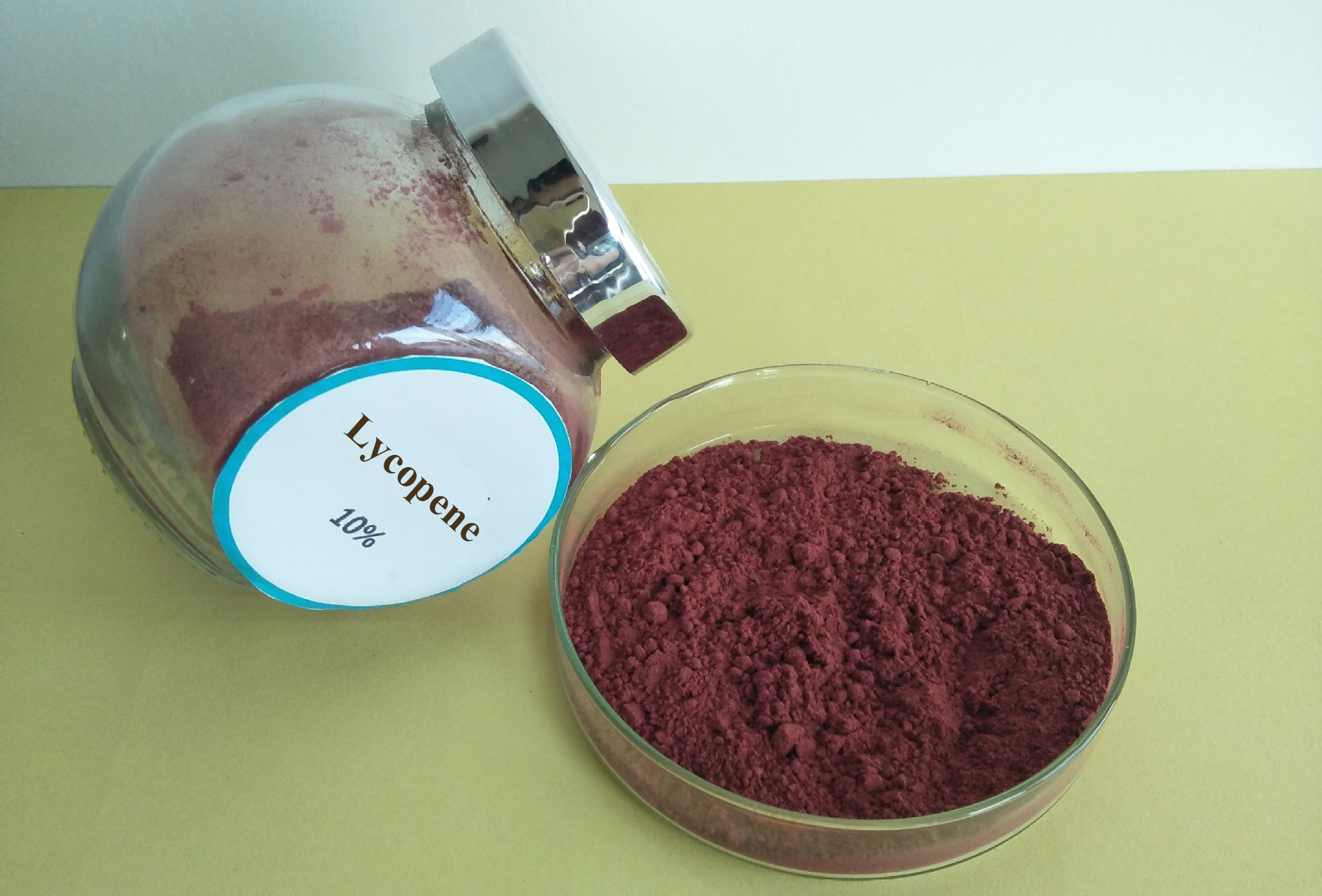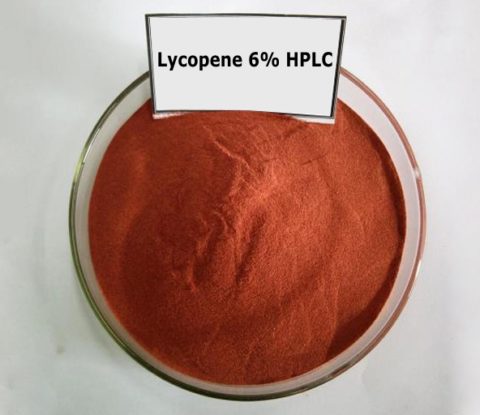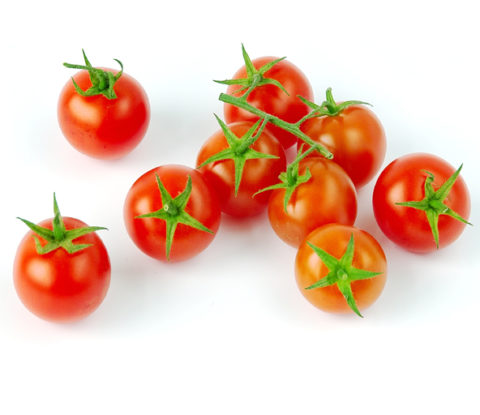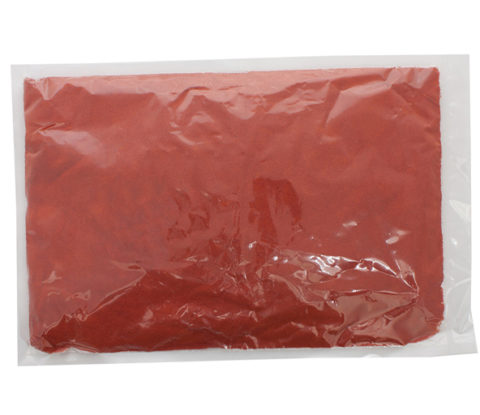
Tomato Extract with Lycopene 6%, 10% HPLC
Lycopene is widely found in tomatoes, watermelon, grapefruit and other fruits. It is the main pigment in mature tomatoes and one of the common carotenoids. It can be used as pigment in food processing and also as raw material of antioxidant health food.
【Botanical Source】: Lycopersicum esculentum
【Part Used】: Fruit
【Active Ingredient】: Lycopene
【Specification】: Lycopene 6%, 10% HPLC
【Molecular formula】: C40H56
【Molecular weight】: 536.88
【CAS No. 】: 502-65-8
【EC No. 】: 207-949-1
【Solubility】: soluble in organic solvents
【Appearance】: Dark red powder
【Particle Size】: 80 mesh
【Packing】: Packed in 25 kg/fiber drum with double plastic bags inside
【Storage】: Store in a cool&dry place away from Moisture, Light, Oxygen
【Shelf】: 24 months since the manufacturing date

Lycopene from the neo-Latin lycopersicum, the tomato species, is a bright red carotene and carotenoid pigment and phytochemical found in tomatoes and other red fruits and vegetables, such as red carrots, watermelons, gac, and papayas, although not in strawberries, or cherries. Although lycopene is chemically a carotene, it has no vitamin A activity. Foods that are not red may also contain lycopene, such as asparagus and parsley.
In plants, algae, and other photosynthetic organisms, lycopene is an important intermediate in the biosynthesis of many carotenoids, including beta carotene, which is responsible for yellow, orange, or red pigmentation, photosynthesis, and photo-protection. Like all carotenoids, it is a polyunsaturated hydrocarbon, i.e. an unsubstituted alkene. Structurally, lycopene is a tetraterpene and assembled from eight isoprene units that are composed entirely of carbon and hydrogen. It is insoluble in water. Lycopene’s eleven conjugated double bonds give its deep red color and its antioxidant activity. Owing to the strong color, it is a useful food coloring (registered as E160d) and is approved for usage in the USA, Australia and New Zealand (registered as 160d) and the EU.
Lycopene is a naturally occurring chemical that gives fruits and vegetables a red color. It is one of a number of pigments called carotenoids. It is found in watermelons, pink grapefruits, apricots, and pink guavas. It is found in particularly high amounts in tomatoes and tomato products. In North America, 85% of dietary lycopene comes from tomato products such as tomato juice or paste. One cup (240 mL) of tomato juice provides about 23 mg of it. Processing raw tomatoes using heat (in the making of tomato juice, tomato paste or ketchup, for example) actually changes the lycopene in the raw product into a form that is easier for the body to use. The lycopene in supplements is about as easy for the body to use as lycopene found in food. People take it for preventing heart disease, “hardening of the arteries” (atherosclerosis); and cancer of the prostate, breast, lung, bladder, ovaries, colon, and pancreas. It is also used for treating human papilloma virus (HPV) infection, which is a major cause of uterine cancer. Some people also use lycopene for cataracts and asthma.
Researches on Lycopene Benefits
1. As a Powerful Antioxidant
lycopene’s antioxidant capabilities can protect your body from the damage induced by pesticides. Studies show that it can protect your liver from common corruption by dichlorvos and also reverse or protect from destruction to your adrenal cortex by atrazine. Another dangerous chemical that you’ve been exposed to before is monosodium glutamate (MSG). Common side effects from consuming MSG include headache, flushing, sweating, facial pressure, numbness, nausea and weakness, according to the Mayo Clinic. These symptoms are mainly neurological because MSG acts as an “excitotoxin” in your brain, meaning that it speeds up cell reactions to the point that it causes cell death, or “apoptosis.” However, a 2016 study discovered that lycopene protects these cells by inhibiting apoptosis when MSG signaled to the brain it was supposed to happen. Another function this phytonutrient can serve is in the treatment of candidiasis, better known as yeast infection. Unlike its effects on MSG toxicity, lycopene actually causes apoptosis to the infecting fungal cells. This is effective for both candidiasis in the mouth and vaginal yeast infections.
In vitro data
Lycopene was 2- to 10-fold more efficient in quenching singlet oxygen than alpha-tocopherol and beta-carotene.[1] The antioxidant activity of lycopene may also be mediated by its bioactive metabolites.[2]
Clinical data
One study involving 20 patients found a correlation between skin roughness and lycopene dietary concentration.[3] In an 8-week, double-blind, randomized, placebo-controlled trial, lycopene supplementation decreased DNA oxidative damage.[4] Lycopene also may ameliorate the oxidative stress of cigarette smoke.[5]
2. Help Prevent Cancer
Human epidemiological evidence indicates that diets high in tomatoes may reduce the risk of cervical, colon, esophageal, rectal, prostate, and stomach cancers.[6] Several molecular mechanisms of actions 4 are documented for lycopene’s anticancer activity, including the following: Antioxidant activity or reduction of free radicals; Antioxidant response element or stimulation of cells to produce enzymes to protect against free radicals; Apoptosis or elimination of unhealthy abnormal cells; Cell-cycle arrest or induction of cell death at the G1 phase; Affect growth factors and signaling pathways critical for cancer cell growth; and Antimetastatic and anti-invasion activity.
In vitro and animal data
In one study, lycopene inhibited human colon carcinoma, myeloid leukemia, and lymphoma cell lines in a dose-dependent manner.[7] Lycopene and eicosapentaenoic acid (EPA) also suppressed signal transduction pathways in human colon cancer cells, thus inhibiting cancer cell growth. 20 Another study documented activity against a liver adenocarcinoma cell line and noncancerous lung cell line. It prevented chemically-induced DNA and chromosome damage and tumor-promoting activity in liver cells through antioxidant activity and inhibition of growth factors and signaling pathways.[8, 9, 10]
Clinical data
In a clinical trial, lycopene supplementation (30 mg/day for 2 months) had beneficial effects in healthy women with a high risk of breast cancer but not in breast cancer survivors.[11]
In a large case-control study covering 3 years, the risk of pancreatic cancer for men consuming lycopene was reduced 31%. Lycopene protected against cancer by activating cancer-preventive phase 2 enzymes.[12]
Growing evidence exists for the use of lycopene in prostate cancer prevention. Although numerous animal studies exist,[13] only the clinical evidence will be reviewed here. In a review of epidemiologic studies, a diet rich in fresh tomatoes, tomato sauce, and pizza reduced the incidence of prostate cancer in a cohort of 40,000 men. Increased consumption of tomatoes statistically lowered the risk of prostate cancer in a cohort of 14,000 Seventh-Day Adventist men.[14] A meta-analysis of 21 studies provided further evidence of diets rich in tomatoes providing protection against prostate cancer.[15] Lycopene was more efficient than any carotenoid in inhibiting insulin-like growth factor type 1 (ie, high levels of this growth factor are related to an increased risk of cancer) in patients with a higher risk of colorectal cancer.[16, 17] Lycopene also inhibited the progression of benign prostate hyperplasia.[18] Lycopene concentrations changed rapidly in men with prostate cancer given lycopene supplements for several weeks prior to radical prostatectomy. Apoptotic activity was observed and may have been caused by lycopene. Prostate volume was reduced in prostate cancer patients taking 30 mg/day of lycopene extract for 3 weeks prior to radical prostatectomy.[19]
Oxidative stress is recognized as a major contributor to increased cancer risk. Lycopene’s efficient absorption from tomato products facilitates its antioxidant effects and may also play an important role in cancer prevention.[20] Lycopene not only achieves high concentrations in the prostate, but also in the testes and adrenal glands. Lycopene intake and decreased cancer risk association has been observed in stomach cancers.[21] Lycopene’s protective role in the early stages of cervical carcinogenesis was noted in 1 study.[22] Plasma levels of lycopene and other carotenoids were lower in women with cervical intraepithelial neoplasia and cervical cancer, suggesting a protective effect of higher lycopene concentrations.[23]
Cardiovascular disease
Its action on cardiovascular disease may be associated with antioxidant activity as well as decreased cell surface adhesion molecule expression and intima-media thickness.
In vitro and animal data
Lycopene suppressed tissue factor activation in vascular thrombosis in human endothelial cells.[24] Additional studies found that it reduced expression of cell surface adhesion molecules and binding of monocytes.[25, 26] Lycopene also bound and inhibited platelet-derived growth factor, which is associated with the development and progression of cardiovascular disease in rat smooth muscle cells.[27] One nutritional study in rabbits compared lycopene’s action in reducing the formation of atherosclerotic plaques in the aorta with that of fluvastatin.[28] There are studies on the development of more efficient vehicles to deliver lycopene to adipocytes.[29]
Clinical data
In 19 subjects, lycopene supplementation decreased serum lipid peroxidation and low-density lipoprotein (LDL) oxidation, suggesting a decreased risk for coronary heart disease (CHD).[30] An epidemiological study in 10 European countries, known as the EURAMIC study, confirmed beneficial effects on the heart correlating with lycopene lipid levels and reduced risk of myocardial infarction.[31] The Austrian Stroke Prevention Study found that certain concentrations of lycopene and other antioxidants may protect against cognitive impairment.[32] Plasma LDL cholesterol concentrations were reduced 14% in 6 men consuming dietary supplements of lycopene at 60 mg/day for a 3-month period.[33] Twenty-four patients in a 6-week clinical trial receiving fresh tomato and tomato juice twice daily reported reduced triglyceride levels and LDL cholesterol and increased high-density lipoprotein cholesterol.[34]
Reference:
1. Erdman JW, Ford NA, Lindshield BL. Are the health attributes of lycopene related to its antioxidant function? Arch Biochem Biophys . 2009;483(2):229-335.
2. Lindshield BL, Canene-Adams K, Erdman JW Jr. Lycopenoids: are lycopene metabolites bioactive? Arch Biochem Biophys . 2007;458(2):136-140.
3. Darvin M, Patzelt A, Gehse S, et al. Cutaneous concentration of lycopene correlates significantly with the roughness of the skin. Eur J Pharm Biopharm . 2008;69(3):943-947.
4. Devaraj S, Mathur S, Basu A, et al. A dose-response study on the effects of purified lycopene supplementation on biomarkers of oxidative stress. J Am Coll Nutr . 2008;27(2):267-273.
5. Polidori MC, Mecocci P, Stahl W, Sies H. Cigarette smoking cessation increases plasma levels of several antioxidant micronutrients and improves resistance towards oxidative challenge. Br J Nutr . 2003;90(1):147-150.
6. Singh P, Goyal GK. Dietary lycopene: its properties and anticarcinogenic effects. Comprehensive reviews in food science and food safety . 2008;7:255-270.
7. Salman H, Bergman M, Djaldetti M, Bessler H. Lycopene affects proliferation and apoptosis of four malignant cell lines. Biomed Pharmacother . 2007;61(6):366-369.
8. Huang CS, Fan YE, Lin CY, Hu ML. Lycopene inhibits matrix metalloproteinase-9 expression and down-regulates the binding activity of nuclear factor-kappa B and stimulatory protein-1. J Nutr Biochem . 2007;18(7):449-456.
9. Tharappel JC, Lehmler HJ, Srinivasan C, Robertson LW, Spear BT, Glauert HP. Effect of antioxidant phytochemicals on the hepatic tumor promoting activity of 3,3′,4,4′-tetrachlorobiphenyl (PCB-77). Food Chem Toxicol. 2008;46(11):3467-3474.
10. Scolastici C, Alves de Lima RO, Barbisan LF, Ferreira AL, Ribeiro DA, Salvadori DM. Antigenotoxicity and antimutagenicity of lycopene in HepG2 cell line evaluated by the comet assay and micronucleus test. Toxicol In Vitro. 2008;22(2):510-514.
11. Voskuil DW, Vrieling A, Korse CM, et al. Effects of lycopene on the insulin-like growth factor (IGF) system in premenopausal breast cancer survivors and women at high familial breast cancer risk. Nutr Cancer . 2008;60(3):342-353.
12. Nkondjock A, Ghadirian P, Johnson KC, Krewski D; Canadian Cancer Registries Epidemiology Research Group. Dietary intake of lycopene is associated with reduced pancreatic cancer risk. J Nutr . 2005;135(3):592-597.
13. van Breemen RB, Pajkovic N. Multitargeted therapy of cancer by lycopene. Cancer Lett . 2008;269(2):339-351.
14. Giovannucci E. A review of epidemiologic studies of tomatoes, lycopene, and prostate cancer. Exp Biol Med (Maywood) . 2002;227(10):852-859.
15. Singh P, Goyal GK. Dietary lycopene: its properties and anticarcinogenic effects. Comprehensive reviews in food science and food safety . 2008;7:255-270.
16. Vrieling A, Voskuil DW, Bonfrer JM, et al. Lycopene supplementation elevates circulating insulin-like growth factor binding protein-1 and -2 concentrations in persons at greater risk of colorectal cancer. Am J Clin Nutr . 2007;86(5):1456-1462.
17. Graydon R, Gilchrist SE, Young IS, Obermüller-Jevic U, Hasselwander O, Woodside JV. Effect of lycopene supplementation on insulin-like growth factor-1 and insulin-like growth factor binding protein-3: a double-blind, placebo-controlled trial. Eur J Clin Nutr . 2007;61(10):1196-1200.
18. Schwarz S, Obermüller-Jevic UC, Hellmis E, Koch W, Jacobi G, Biesalski HK. Lycopene inhibits disease progression in patients with benign prostate hyperplasia. J Nutr . 2008;138(1):49-53.
19. Gupta S. Prostate cancer chemoprevention: current status and future prospects. Toxicol Appl Pharmacol . 2007;224(3):369-376.
20. Rao AV, Agarwal S. Bioavailability and in vivo antioxidant properties of lycopene from tomato products and their possible role in the prevention of cancer. Nutr Cancer . 1998;31(3):199-203.
21. Gerster H. The potential role of lycopene for human health. J Am Coll Nutr . 1997;16(2):109-126.
22. Kanetsky PA, Gammon MD, Mandelblatt J, et al. Dietary intake and blood levels of lycopene: association with cervical dysplasia among non-Hispanic, black women. Nutr Cancer . 1998;31(1):31-40.
23. Palan PR, Mikhail MS, Goldberg GL, Basu J, Runowicz CD, Romney SL. Plasma levels of beta-carotene, lycopene, canthaxanthin, retinol, and alpha- and tau-tocopherol in cervical intraepithelial neoplasia and cancer. Clin Cancer Res . 1996;2(1):181-185.
24. Lee DK, Grantham RN, Mannion JD, Trachte AL. Carotenoids enhance phosphorylation of Akt and suppress tissue factor activity in human endothelial cells. J Nutr Biochem . 2006;17(11):780-786.
25. Martin KR, Wu D, Meydani M. The effect of carotenoids on the expression of cell surface adhesion molecules and binding of monocytes to human aortic endothelial cells. Atherosclerosis . 2000;150(2):265-274.
26. Hung CF, Huang TF, Chen BH, Shieh JM, Wu PH, Wu WB. Lycopene inhibits TNF-alpha-induced endothelial ICAM-1 expression and monocyte-endothelial adhesion. Eur J Pharmacol . 2008;586(1-3):275-282.
27. Lo HM, Hung CF, Tseng YL, Chen BH, Jian JS, Wu WB. Lycopene binds PDGF-BB and inhibits PDGF-BB-induced intracellular signaling transduction pathway in rat smooth muscle cells. Biochem Pharmacol . 2007;74(1):54-63.
28. Hu MY, Li YL, Jiang CH, Liu ZQ, Qu SL, Huang YM. Comparison of lycopene and fluvastatin effects on atherosclerosis induced by a high-fat diet in rabbits. Nutrition . 2008;24(10):1030-1038.
29. Gouranton E, Yazidi CE, Cardinault N, Amiot MJ, Borel P, Landrier JF. Purified low-density lipoprotein and bovine serum albumin efficiency to internalise lycopene into adipocytes. Food Chem Toxicol . 2008;46(12):3832-3836.
30. Agarwal S, Rao AV. Tomato lycopene and low density lipoprotein oxidation: a human dietary intervention study. Lipids . 1998;33(10):981-984.
31. Kohlmeier I, Kark JD, Gomez-Gracia E, et al. Lycopene and myocardial infarction risk in the EURAMIC study. Am J Epidemiol . 1997;146(8):618-626.
32. Schmidt R, Hayn M, Reinhart B, et al. Plasma antioxidants and cognitive performance in middle-aged and older adults: results of the Austrian Stroke Prevention Study. J Am Geriatr Soc . 1998;46(11):1407-1410.
33. Fuhrman B, Elis A, Aviram M. Hypocholesterolemic effect of lycopene and beta-carotene is related to suppression of cholesterol synthesis and augmentation of LDL receptor activity in macrophages. Biochem Biophys Res Commun . 1997;233(3):658-662.
34. Shen YC, Chen SL, Wang CK. Contribution of tomato phenolics to antioxidation and down-regulation of blood lipids. J Agric Food Chem . 2007;55(16):6475-6481.






